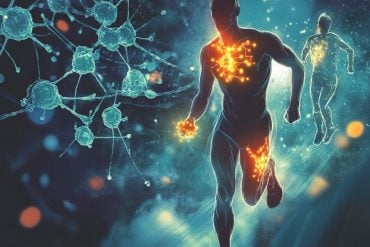Summary: Widespread pain, a subset of chronic pain associated with musculoskeletal disorders, is linked to an increased risk of all types of dementias, including Alzheimer’s disease, and a greater risk of stroke.
Source: BMJ
Widespread pain is linked to a heightened risk of all types of dementia, including Alzheimer’s disease, and stroke, finds research published online in the journal Regional Anesthesia & Pain Medicine.
And this association is independent of potentially influential factors, such as age, general health, and lifestyle, the findings indicate.
Widespread pain is a common subtype of chronic pain that may reflect musculoskeletal disorders. Several studies suggest that it can reliably predict cancer, peripheral arterial disease, and cardiovascular disease, and it has been linked to a heightened risk of death.
While chronic pain may be an early indicator of cognitive decline, it’s not clear if widespread pain might also be linked to a heightened risk of dementia and stroke.
To try and find out, the researchers drew on data from 2464 second generation participants of the US long term, multigenerational, community-based Framingham Heart Study, known as the Offspring Study.
Participants were given a comprehensive check-up, which included a physical exam, lab tests, and detailed pain assessments between 1990 and 1994.
They were divided into three pain groups: widespread pain—defined according to American College of Rheumatology criteria as pain above and below the waist, on both sides of the body, the skull, backbone and ribs (347 people; 14%); other pain—classified as pain in one or more joint(s) only or no pain in any joints (2117 people in total).

Information on potentially influential factors was also collected. This included evidence of high blood pressure and diabetes; weight (BMI); lifestyle (smoking, drinking, diet, physical activity levels); employment status; depression scores; history of pain medication; income, marital status and educational attainment.
Participants were then continuously monitored for the beginnings of cognitive decline and clinical dementia (average of 10 years) or a first stroke (average of 15 years).
During the monitoring period, 188 people were diagnosed with some form of dementia, 50 (27%) of whom had widespread pain and 138 (73%) of whom didn’t. And 139 people had a stroke, 31 (22%) of whom had widespread pain and 108 (78%) of whom didn’t.
After taking account of potentially influential factors, people with widespread pain were 43% more likely to have any type of dementia, 47% more likely to have Alzheimer’s disease, and 29% more likely to have a stroke than those without widespread pain.
When only the over 65s were included, these risks were comparable: 39% heightened risk of all types of dementia; 48% heightened risk of Alzheimer’s disease; and 54% heightened risk of stroke.
This is an observational study, and as such, can’t establish cause. The actual numbers of dementia and stroke cases were small, while the relationship between pain and cognitive decline is likely to be multifactorial, the researchers caution.
Nevertheless they conclude: “These findings provide convincing evidence that [widespread pain] may be a risk factor for all-cause dementia, [Alzheimer’s disease], and stroke. This increased risk is independent of age, sex, multiple sociodemographic factors, and health status and behaviours.”
Widespread pain might directly affect cognitive function or it might be part of a prodromal phase of dementia and Alzheimer’s disease, they suggest by way of an explanation for their findings, adding that further larger studies are needed to explore these possibilities.
About this pain and dementia research news
Author: BMJ Media Relations
Source: BMJ
Contact: BMJ Media Relations – BMJ
Image: The image is in the public domain
Original Research: Open access.
“Association between widespread pain and dementia, Alzheimer’s disease and stroke: a cohort study from the Framingham Heart Study” by Kanran Wang and Hong Liu. Regional Anesthesia and Pain Medicine
Abstract
Association between widespread pain and dementia, Alzheimer’s disease and stroke: a cohort study from the Framingham Heart Study
Background and objective
Chronic pain may be an early indicator of cognitive decline, but previous studies have not systematically examined the population-level associations between widespread pain and adverse cognitive outcomes and stroke. This study was designed to determine the association between widespread pain, a common subtype of chronic pain, and subsequent dementia, Alzheimer’s disease dementia and stroke.
Methods
This retrospective cohort study used data from the US community-based Framingham Heart Study. Pain status was assessed at a single time point between 1990 and 1994. Widespread pain was determined based on the Framingham Heart Study pain homunculus. Dementia follow-up occurred across a median of 10 years (IQR, 6–13 years) for persons who were dementia free at baseline. Proportional hazard models examined associations between widespread pain and incident dementia, Alzheimer’s disease dementia and stroke.
Results
A total of 347 (14.1%) subjects fulfilled the criteria for widespread pain, whereas 2117 (85.9%) subjects did not. Of 188 cases of incident all-cause dementia, 128 were Alzheimer’s disease dementia. In addition, 139 patients suffered stroke during the follow-up period. After multivariate adjustment including age and sex, widespread pain was associated with 43% increase in all-cause dementia risk (HR: 1.43; 95% CI 1.06 to 1.92), 47% increase in Alzheimer’s disease dementia risk (HR: 1.47; 95% CI 1.13 to 2.20) and 29% increase in stroke risk (HR: 1.29; 95% CI 1.08 to 2.54). Comparable results were shown in the subgroup of individuals over 65 years old.
Conclusion
Widespread pain was associated with an increased incidence of all-cause dementia, Alzheimer’s disease dementia and stroke.
Trial registration number







